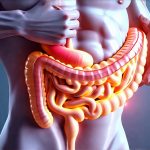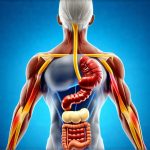Overtraining is an increasingly common issue amongst athletes and active individuals, yet its ramifications often extend far beyond diminished performance. While traditionally focused on muscular fatigue and hormonal imbalances, current research reveals a profound connection between intense physical stress and the health of our gut – specifically, how it impacts blood flow within the digestive system and, consequently, nutrient absorption. This isn’t simply about experiencing gastrointestinal distress during or after exercise; it’s about a systemic disruption that can compromise overall health, immune function, and recovery capacity. Understanding this complex interplay is crucial for optimizing training strategies and supporting long-term wellbeing.
The gut microbiome – the vast ecosystem of bacteria residing in our digestive tract – plays an integral role in virtually every bodily process. It aids digestion, synthesizes vitamins, modulates immunity, and even influences mental health. However, intense exercise places considerable stress on the body, triggering a cascade of physiological responses that can negatively affect this delicate microbial balance. Reduced blood flow to the gut during strenuous activity, coupled with increased cortisol levels (a stress hormone), creates an environment where harmful bacteria may thrive while beneficial ones are suppressed. This disruption isn’t merely confined to athletes; anyone undergoing prolonged periods of physical or mental stress could experience similar effects, highlighting the importance of proactive strategies for gut health maintenance. It’s important to understand how stress-eating can impact this delicate balance.
Gut Blood Flow & The Overtraining Connection
The gastrointestinal tract is a metabolically demanding organ system, requiring significant blood flow to function optimally. During exercise, however, blood flow is preferentially directed away from the gut and towards working muscles – a natural physiological response designed to support immediate energy demands. In moderate exercise, this shift is temporary and easily reversed. However, chronic overtraining or sustained high-intensity activity can lead to prolonged reductions in splanchnic (gut) blood flow, creating a state of hypoperfusion. This reduced perfusion not only compromises gut function but also impacts the integrity of the intestinal barrier – often referred to as “leaky gut”. A compromised barrier allows undigested food particles, bacteria, and toxins to enter the bloodstream, triggering systemic inflammation and immune activation. Understanding how water quality impacts gut health is also essential here.
Furthermore, the stress hormone cortisol, released in abundance during overtraining, further exacerbates this issue. Cortisol not only constricts blood vessels, reducing gut perfusion, but also alters intestinal permeability, making it even more vulnerable to leakage. This combination of reduced blood flow and increased permeability creates a vicious cycle, leading to impaired nutrient absorption and potentially contributing to conditions like irritable bowel syndrome (IBS) or other digestive disorders. The body’s attempts to manage the resulting inflammation further divert resources away from recovery and performance optimization, perpetuating the overtraining state.
Mechanisms of Nutrient Malabsorption
Reduced gut blood flow directly impacts the ability of intestinal cells – enterocytes – to absorb nutrients effectively. These cells rely on a constant supply of oxygen and nutrients delivered via the bloodstream to function properly. When blood flow is compromised, their absorptive capacity diminishes significantly. Specific nutrient absorption processes are particularly vulnerable:
- Fat-soluble vitamins (A, D, E, K): Absorption relies heavily on efficient bile acid production and micelle formation – processes that become impaired with reduced gut perfusion.
- Amino acids: Transport across the intestinal wall requires energy and active transport mechanisms, both of which are compromised in a hypoperfused state.
- Glucose & other carbohydrates: While carbohydrate absorption is generally more resilient, prolonged overtraining can still disrupt glucose transporter function and overall digestive efficiency.
Beyond impaired absorption, gut dysbiosis – an imbalance in the gut microbiome – further complicates matters. Specific bacterial strains play crucial roles in digesting and processing certain nutrients. When these strains are depleted or overtaken by harmful bacteria, it leads to maldigestion and reduced bioavailability of essential nutrients. For example, imbalances can affect the breakdown of lactose, leading to bloating and discomfort. This is especially relevant when considering fermented dairy as a potential source of probiotics.
The Role of Intestinal Permeability
As previously mentioned, overtraining increases intestinal permeability – often called “leaky gut”. This isn’t a disease in itself but rather a sign of compromised gut health. The tight junctions between enterocytes become looser, allowing larger molecules to pass through the intestinal barrier and into the bloodstream. This triggers an immune response as the body recognizes these foreign substances as threats. Chronic inflammation is a hallmark of this process, contributing to systemic fatigue, muscle soreness, and impaired recovery.
The consequences extend beyond immune activation:
– Increased risk of food sensitivities: The constant bombardment of undigested food particles can lead to the development of allergies or intolerances.
– Reduced nutrient absorption: Inflammation damages the intestinal lining, further hindering absorptive capacity.
– Systemic inflammation: Chronic low-grade inflammation negatively impacts all bodily systems, including cardiovascular health and cognitive function. Understanding vitamin D activation is also crucial in supporting immune response.
Strategies for Gut Support During Overtraining
Addressing gut health during periods of overtraining requires a multifaceted approach focusing on restoring blood flow, repairing the intestinal barrier, and rebalancing the microbiome. Dietary interventions are paramount:
- Prioritize easily digestible foods: Reduce fiber intake temporarily to lessen the digestive burden on a compromised gut. Focus on cooked vegetables, lean proteins, and healthy fats.
- Incorporate glutamine: This amino acid plays a vital role in repairing intestinal lining and improving barrier function. Supplementation or increased dietary sources (bone broth, collagen) can be beneficial.
- Probiotic & prebiotic support: Introducing probiotic-rich foods (yogurt, kefir, sauerkraut) or supplements can help repopulate the gut with beneficial bacteria. Prebiotics – fibers that feed those bacteria – are also essential for their growth and activity.
- Manage stress levels: Employing stress reduction techniques such as meditation, yoga, or mindfulness can lower cortisol levels and support overall gut health.
- Hydration: Adequate hydration is crucial for maintaining healthy intestinal motility and nutrient absorption. It’s important to note how late-night eating can disrupt this process, too.
In conclusion, the effects of overtraining are far more encompassing than simply muscle fatigue. The intricate connection between physical stress, gut blood flow, intestinal permeability, and nutrient absorption highlights the importance of a holistic approach to athlete health and wellbeing. By understanding these mechanisms and implementing targeted strategies for gut support, individuals can optimize their recovery, enhance performance, and safeguard long-term health. Additionally, consider how caffeine consumption may affect the gut microbiome. Finally, understanding mineral absorption is key to optimizing overall health.


















